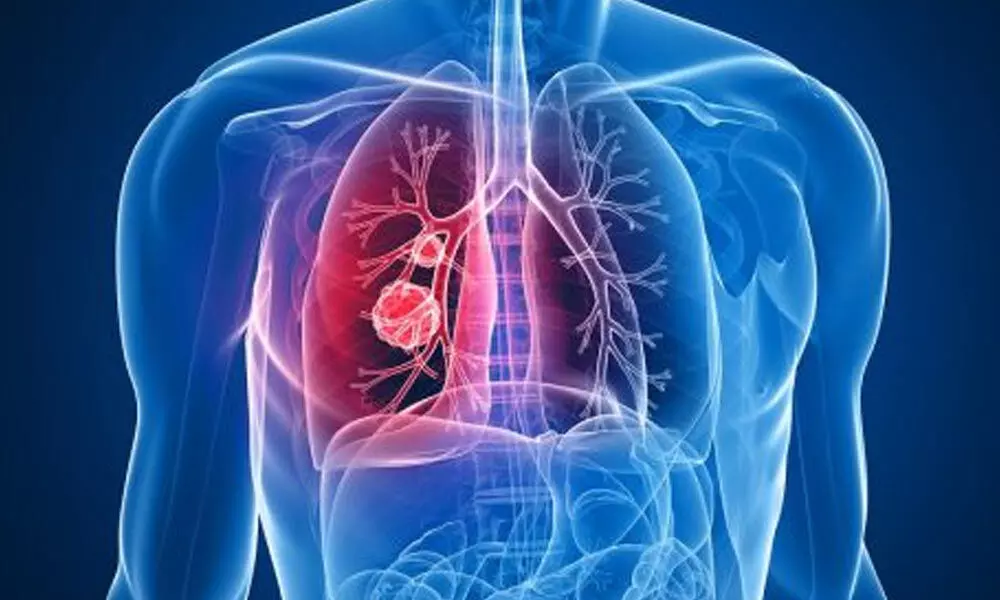Lung cancer incidence rising among women, say experts

Lung cancer incidence rising among women, say experts
- Owing to reverse smoking, high lung cancer incidences seen in women
- 80-85% of patients continue to report lung cancer at advanced stages
- Targeted tissue therapy fast becoming best alternative to chemotherapy for cancer treatment
Bengaluru: Ahead of World Lung Cancer Day, experts at Neuberg Centre for Genomic Medicine panel discussion on "Lung cancer detection – How late, is late?' said lately there has been an increase in number of women falling prey to the disease. The incidence of lung cancer among men continues to be high. However, the rising number of cases among women has become a cause of concern.
According to experts, weight loss, sputum production, cough, and coughing blood are some of the prominent symptoms of lung cancer. Once cancer spreads from the lungs, it can go to the liver causing jaundice, spread to the adrenal glands causing them to fail, resulting in a low-BP emergency, pain, and fracture in bones and stroke or seizures when cancer reaches the brain.
Smoking cigarettes, tobacco chewing, kheni, hookah, betel leaf with tobacco, reverse smoking, household and traffic pollutants, are the main causes of lung cancer, apart from occupational factors such as working in industries, mining sector, etc. The disease burden of tobacco-related malignancies is expected to rise by 12 percent in India in the next few years, the panelists stated.
Dr (Brig) S. Viswanath, Medical Oncologist, Kumaran Hospital, said, "Most of the times lung cancer is mistaken for tuberculosis in the earlier stages as the symptoms of both the diseases are very similar. In both the cases, a patient experiences cough and or coughing up blood. Smoking continues to be a major cause for lung cancer, the risk of developing lung cancer in smokers versus non-smokers is 20:1. A passive smoker has an increased chance of contracting cancer than a smoker. For treating the patient at the early stage, surgery is the most important method followed by radiotherapy. Now, more advanced therapy like targeted therapy and immunotherapy options are available which increases overall survival of patients. Targeted and immunotherapies have fewer side effects compared to chemotherapy. Genetic testing has been a boon in deciding the therapy options leading to better survival rates. "
Dr Jagannath Dixit, Consultant Surgical Oncology, HCG Cancer Hospital, said, "50% of the lung cancer patients die in the first-year post-diagnosis. We can ensure a 14% to 20% decrease in deaths if the cancer is detected at the earlier stages. However, early symptoms are less visible, hence it is difficult to detect lung cancer at early stages. Reverse smoking has come across as a major cause of lung cancer among the rural women, especially those who work in the field in northern Karnataka."
Dr Dixit emphasized on having a multidisciplinary care for patients with cancer where surgical, medical, molecular pathologist and genetic counsellor contribute. There has been a drastic shift in the survival rate after the advent of targeted therapy and genetic testing.
Dr. Siddharth Srivastava, Chief Scientist (Molecular Oncology), Neuberg Center of Genomic Medicine, said, "Targeted therapy has emerged as an important method to treat cancer. Targeted therapies act on specific molecular targets associated with cancer, whereas most standard chemotherapies act on all rapidly dividing normal and cancerous cells, which also kill normal cells. Targeted therapy is known to cause lesser side effects as compared to chemotherapy while improving the quality of life of patients."
S Owing to reverse smoking, high lung cancer incidences seen in women
S 80-85% of patients continue to report lung cancer at advanced stages
S Targeted tissue therapy fast becoming best alternative to chemotherapy for cancer treatment
S The life expectancy of lung cancer patients has increased from less than a year to 3-5 years with the help of genetic testing even in advanced stage cancer







